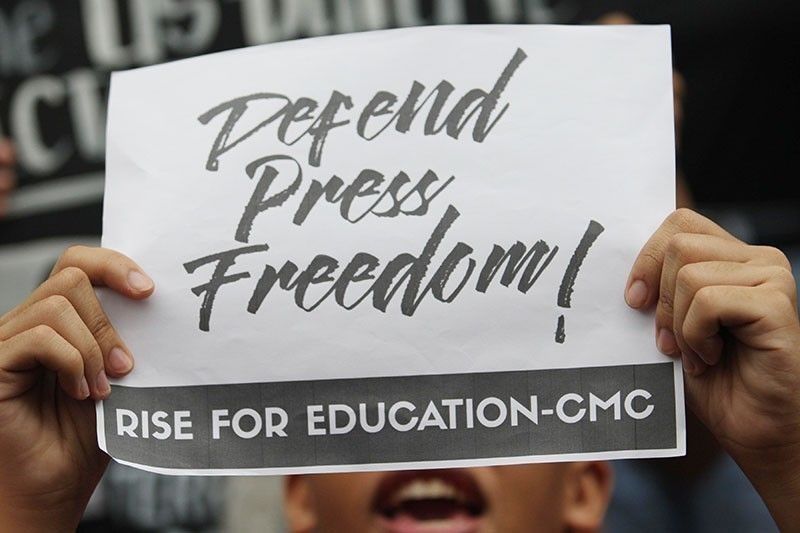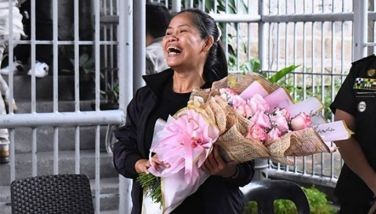Journalists: Quo warranto vs ABS-CBN 'legal gymnastics' to silence media

MANILA, Philippines (Updated 4:58 p.m.) — Journalists deplored Solicitor General Jose Calida’s plea asking the Supreme Court to revoke the franchise of ABS-CBN, calling it an attack on press freedom and “legal gymnastics” to silence critical media.
The National Union of Journalists of the Philippines said that Calida’s petition is proof that “this government is hellbent on using all its powers to shut down” ABS-CBN.
“So much so that it would risk trampling on Congress’ authority to legislate franchises,” the journalists' group said.
[Statement] Defend Press Freedom! Defend the People's Right to Know! #no2ABSCBNshutdown pic.twitter.com/NBGLHELHQz
— NUJP (@nujp) February 10, 2020
ABS-CBN has a little more than a month left on its franchise, with bills calling for its renewal pending before Congress.
But Calida on Monday asked the SC to grant its quo warranto petition, accusing the network giant and its subsidiary, ABS-CBN Convergence, of “unlawfully practicing their legal franchise.”
NUJP Chairperson Nonoy Espina in a separate phone patch interview noted that the timing of the filing is curious.
“If they can’t stop Congress from acting on the bills, then the quo warranto is the way to go, at least to stop it,” he said.
Some lawmakers are also unwelcoming of the petition as they asserted that ABS-CBN’s franchise is a matter with Congress.
Espina called on the Congress, especially in the Committee of Congressional Franchises, to “start the ball rolling” on the renewal of ABS-CBN’s legislative franchise.
“It’s not too late,” Espina said.
ON ABS-CBN - The Foreign Correspondents Association of the Philippines denounces moves by the government to shutter the country’s largest broadcaster, ABS-CBN Corp. and its subsidiary. The moves follow Pres. Rodrigo Duterte’s repeated public tirade against the TV network.
— FOCAP (@FOCAP2020) February 10, 2020
In a statement on Monday afternoon, the Foreign Correspondents Association of the Philippines also criticized Calida's move, which, it noted "[follows] President Rodrigo Duterte’s repeated public tirades against the TV network."
It called the network "a cornerstone of Philippine democracy and the free press for its independent and critical reportage and massive following in the country and abroad."
·
It added: "ABS-CBN’s franchises,which the Sol-Gen sought to revoke, are due to expire next month.These moves politically harass and threaten a pillar of the media industry that employs thousands of Filipinos and has played a crucial part in helping fight official corruption and abuse for decades."
"Our ABS-CBN colleagues have been on the frontlines of every major breaking news in the country. They have chronicled history, and continue to hold power to account."
Media companies and PDRs
Online news site Rappler, which has also been at the end of several legal suits from the government, expressed solidarity with ABS-CBN.
“The Duterte administration, through Mr. Calida, is resorting to legal gymnastics to push their own agenda of silencing critical media,” Rappler said in a statement.
The Securities and Exchange Commission in 2018, upon the prodding of Calida, issued a closure order to Rappler over the use of PDRs—the same issue Calida is raising against ABS-CBN to the Supreme Court.
PDRs are instruments that give foreign investors a passive economic interest in a Philippine company.
Omidyar donated its PDRs to Rappler and the SEC is looking into the legal effect of this on Rappler’s case.
“We reiterate that PDRs are financial instruments used by media entities to allow foreign investments without violating the constitutional rule that media companies should be 100% Filipino-owned. PDRs are a common, lawful practice, and their legality has been upheld by the SC,” Rappler said.
'Reminiscent of martial law'
The University of the Philippines College of Mass Communications also joined the growing voices deploring the quo warranto petition.
In a statement, UP CMC recalled that the Philippines won back the right to information and free press 34 years ago, after it toppled the martial law regime of the late dictator Ferdinand Marcos.
But government actions such as the filing of the plea against ABS-CBN “show us the volatility of this hard-won freedom, the need to remain vigilant so as to not allow history to repeat itself,” it said.
UP CMC also noted that the quo warranto plea against ABS-CBN is not the first time the government attacked press freedom, citing legal suits against Rappler and the “use of spurious data and fake news against media institutions like VERA files and the Philippine Center for Investigative Journalism.”
- Latest
- Trending


































